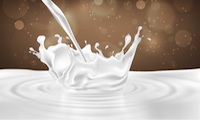Jul 13, 2017Milk Options
When today’s athletes grab a beverage, many are choosing a milk-based sports nutrition drink. The number of these drinks on the market has increased rapidly in recent years. In fact, a quick perusal of my local health club’s supplement section revealed more than 20 different varieties, all with slightly different ingredients. That means more options, which is great, but it can also mean more confusion for athletes.
Milk-based products all contain actual milk (and/or soy milk) or different combinations of modified milk proteins. One of the most popular milk proteins added is whey protein isolate.
Milk has two primary proteins, whey and casein. When milk is curdled (or made into cheese or cottage cheese), the solid portion is casein, while the remaining liquid is whey. Interestingly, for years and years, the whey liquid was discarded as a useless waste product during cheese-making. Now we know that whey protein is actually a high quality protein source–it is rich in branched-chain amino acids, which are important to exercising muscles. Whey protein isolate is produced by separating whey protein even further and eliminating non-protein compounds to make a pure protein product.

Most of the popular milk-based beverages are good sources of protein, containing 10 to 40 grams per serving. In addition to helping athletes achieve overall protein needs, the protein is significant because it has been found to enhance muscle synthesis after strength training, a concept I will detail in the next section of this article.
There may also be other benefits of protein, although they have not been confirmed with enough research. Some manufacturers claim that certain proteins or amino acid combinations can enhance immune function, but not all studies support this notion. Some of these beverages are also fortified with glutamine (in addition to the glutamine that occurs naturally in some of the ingredients) because it has been theorized to be involved with muscle recovery and synthesis. However, studies have not confirmed this. Some research has shown that consuming protein during the recovery period prevents muscle damage caused by exercise-induced circulating free radicals, but more research is needed in this area, too.
The carbohydrate content of milk-based beverages varies widely, from 10 to as much as 90 grams per serving. The source of carbohydrates is typically a combination of simple sugars (such as dextrose or sucrose) and starches. In some cases, lactose, the naturally occurring sugar in milk, has been mostly removed from the beverages. However, most still contain some lactose.
Fat content varies from about two to 15 grams per serving, sometimes derived from the milk ingredients but more often from added oils and fats. The fat enhances the product’s taste and texture, but obviously would be detrimental to athletes who are concerned with weight gain. At least two available products contain medium chain triglycerides. They are marketed as being better utilized during activity–although peer-reviewed research to support this claim is lacking.
In terms of vitamins and minerals, many milk-based beverages are naturally high in calcium, zinc, and vitamin D due to their milk base. Calcium content ranges from 300 to 600 mg per serving, which represents 20 to 50 percent of athletes’ daily needs, depending on age and gender. If the powdered beverages are mixed with milk, there is opportunity for even more calcium, protein, and carbohydrate. If they are mixed with juice, they may be good sources of vitamin C and contain additional carbohydrates.
Most products are also fortified with extra vitamins and minerals, which is a plus. There are a few products that contain creatine, caffeine, or other supplemental additives and thus should be used with caution. Additional ingredients found in some (but not all) of these beverages include stabilizers, thickeners, artificial flavoring, coloring, and sweeteners.


